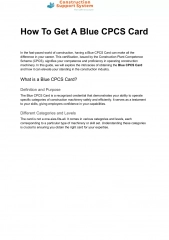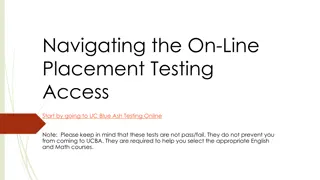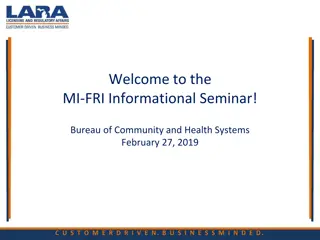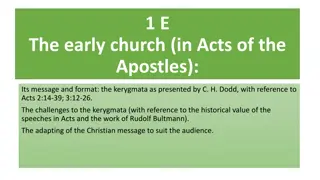
Insights from Acts 25-26: Agrippa, Bernice, Festus, and Paul
Explore key events in Acts 25-26 where Agrippa, Bernice, and Festus make significant decisions regarding Paul's fate. Discover how Agrippa and Bernice entered the audience room, why Festus sent Paul to Rome, what Festus found unreasonable, and who gave Paul permission to speak for himself.
Download Presentation

Please find below an Image/Link to download the presentation.
The content on the website is provided AS IS for your information and personal use only. It may not be sold, licensed, or shared on other websites without obtaining consent from the author. If you encounter any issues during the download, it is possible that the publisher has removed the file from their server.
You are allowed to download the files provided on this website for personal or commercial use, subject to the condition that they are used lawfully. All files are the property of their respective owners.
The content on the website is provided AS IS for your information and personal use only. It may not be sold, licensed, or shared on other websites without obtaining consent from the author.
E N D
Presentation Transcript
Acts Dig Site 18 Blue Level Questions
How did Agrippa and Bernice enter the audience room? (25:23) 1. With great pomp 2. With the high-ranking military officers 3. With the prominent men of the city 4. All of the above
How did Agrippa and Bernice enter the audience room? (25:23) 1. With great pomp 2. With the high-ranking military officers 3. With the prominent men of the city 4. All of the above
Why did Festus decide to send Paul to Rome? (25:25) 1. Because Paul had done things deserving of death 2. Because Paul had made his appeal to the Emperor 3. Because Felix told him to send him there 4. Because Paul had offended Festus
Why did Festus decide to send Paul to Rome? (25:25) 1. Because Paul had done things deserving of death 2. Because Paul had made his appeal to the Emperor 3. Because Felix told him to send him there 4. Because Paul had offended Festus
What did Festus think was unreasonable? (25:27) 1. To send a prisoner on to Rome without specifying the charges against him 2. Paul s requests for freedom and protection 3. The Jew s demands to kill Paul 4. All of the above
What did Festus think was unreasonable? (25:27) 1. To send a prisoner on to Rome without specifying the charges against him 2. Paul s requests for freedom and protection 3. The Jew s demands to kill Paul 4. All of the above
Who gave Paul permission to speak for himself? (26:1) 1. Festus 2. The commander 3. Agrippa 4. Bernice
Who gave Paul permission to speak for himself? (26:1) 1. Festus 2. The commander 3. Agrippa 4. Bernice
Paul asked King Agrippa to listen to him how? (26:3) 1. Patiently 2. Carefully 3. Cautiously 4. Sensibly
Paul asked King Agrippa to listen to him how? (26:3) 1. Patiently 2. Carefully 3. Cautiously 4. Sensibly
How did Paul live as a Pharisee? (26:5) 1. He lived as a Sadducee. 2. According to the strictest sect of the religion 3. By pretending he was a Pharisee 4. By going behind their backs and doing as he pleased
How did Paul live as a Pharisee? (26:5) 1. He lived as a Sadducee. 2. According to the strictest sect of the religion 3. By pretending he was a Pharisee 4. By going behind their backs and doing as he pleased
According to Paul, why was he on trial? (26:6) 1. Because he had put Christians in prison 2. Because of his hope in what God had promised their ancestors 3. Because he had healed someone 4. Because Festus could not make a ruling
According to Paul, why was he on trial? (26:6) 1. Because he had put Christians in prison 2. Because of his hope in what God had promised their ancestors 3. Because he had healed someone 4. Because Festus could not make a ruling
According to Paul, who was hoping to see the promise of God fulfilled? (26:7) 1. Those who stood there 2. All people 3. The twelve tribes 4. King Agrippa
According to Paul, who was hoping to see the promise of God fulfilled? (26:7) 1. Those who stood there 2. All people 3. The twelve tribes 4. King Agrippa
What did Paul do in Jerusalem before he was saved? (26:9-10) 1. He did all that was possible to oppose the name of Jesus. 2. He supported the church in all they did. 3. He worked as a tax collector. 4. He preached in the church.
What did Paul do in Jerusalem before he was saved? (26:9-10) 1. He did all that was possible to oppose the name of Jesus. 2. He supported the church in all they did. 3. He worked as a tax collector. 4. He preached in the church.
What did Paul do in his obsession against Jesus followers? (26:11) 1. He hunted them down in foreign cities. 2. He preached for them. 3. He told lies about them. 4. He raised their taxes.
What did Paul do in his obsession against Jesus followers? (26:11) 1. He hunted them down in foreign cities. 2. He preached for them. 3. He told lies about them. 4. He raised their taxes.
What did Paul see on the road to Damascus? (26:13) 1. An image of Peter 2. Heaven 3. Many Gentile travelers 4. A light from heaven
What did Paul see on the road to Damascus? (26:13) 1. An image of Peter 2. Heaven 3. Many Gentile travelers 4. A light from heaven
Why had the Lord appeared to Paul on the road to Damascus? (26:16) 1. To show him exactly who to persecute 2. To kill him 3. To appoint him as a servant and as a witness of what he had seen and would see of Jesus 4. To punish him
Why had the Lord appeared to Paul on the road to Damascus? (26:16) 1. To show him exactly who to persecute 2. To kill him 3. To appoint him as a servant and as a witness of what he had seen and would see of Jesus 4. To punish him
Why was the Lord sending Paul to his own people and to the Gentiles? (26:17-18) 1. To turn them from darkness to light, and from the power of Satan to God 2. So that they may receive forgiveness of sins 3. So they may receive a place among those who are sanctified by faith in [Jesus] 4. All of the above
Why was the Lord sending Paul to his own people and to the Gentiles? (26:17-18) 1. To turn them from darkness to light, and from the power of Satan to God 2. So that they may receive forgiveness of sins 3. So they may receive a place among those who are sanctified by faith in [Jesus] 4. All of the above
What message did Paul preach in Damascus, Jerusalem, and all Judea? (26:19-20) 1. That they should repent 2. That they should turn to God 3. That they should demonstrate their repentance by their deeds 4. All of the above
What message did Paul preach in Damascus, Jerusalem, and all Judea? (26:19-20) 1. That they should repent 2. That they should turn to God 3. That they should demonstrate their repentance by their deeds 4. All of the above
Who had helped Paul to that very day, the day he testified before Agrippa? (26:22) 1. The government 2. God 3. Felix 4. His family
Who had helped Paul to that very day, the day he testified before Agrippa? (26:22) 1. The government 2. God 3. Felix 4. His family
What did Festus say was driving Paul insane? (26:24) 1. His great learning 2. His unbelievable teachings 3. His prison sentence 4. His unshakable faith
What did Festus say was driving Paul insane? (26:24) 1. His great learning 2. His unbelievable teachings 3. His prison sentence 4. His unshakable faith
Who did Paul ask if he believed the prophets? (26:27) 1. Festus 2. King Agrippa 3. The high priest 4. The governor
Who did Paul ask if he believed the prophets? (26:27) 1. Festus 2. King Agrippa 3. The high priest 4. The governor
According to Agrippa, how could Paul have been set free? (26:32) 1. Had he not appealed to Caesar 2. He had not have preached to the Gentiles 3. Had he not broken the law 4. Had he not escaped from prison
According to Agrippa, how could Paul have been set free? (26:32) 1. Had he not appealed to Caesar 2. He had not have preached to the Gentiles 3. Had he not broken the law 4. Had he not escaped from prison
According to Acts 4:20, what can we not help doing? 1. Telling others about Jesus Christ 2. Speaking about what we have seen and heard 3. Sharing about the love of God 4. Loving others
According to Acts 4:20, what can we not help doing? 1. Telling others about Jesus Christ 2. Speaking about what we have seen and heard 3. Sharing about the love of God 4. Loving others






















